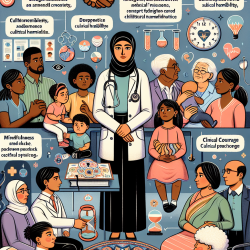The field of family medicine offers a unique lens through which practitioners can enhance their skills and improve patient care. The research article "Storylines of Family Medicine IV: Perspectives on Practice—Lenses of Appreciation" provides valuable insights into the relational aspects of medical practice that are often overlooked in traditional medical education. This blog explores key themes from the article that practitioners can implement to enrich their practice and encourage further research.
Relational Connections in the Doctor–Patient Partnership
The doctor-patient relationship is a cornerstone of effective healthcare delivery. Radeeb Akhtar and Jeff Ring emphasize the importance of respectful engagement and compassionate patient-centered care. Practitioners are encouraged to explore their biases and assumptions to improve communication and decision-making with patients, particularly those from minority backgrounds who may face health inequities.
- Self-Reflection: Engage in ongoing self-appraisal to understand personal biases and cultural backgrounds.
- Cultural Humility: Recognize and respect the cultural priorities of patients while being flexible and humble.
- Active Listening: Use verbal and non-verbal communication to transform routine care into healing rituals.
Cultivating Mindful Practice
Mindful practice involves being purposefully attentive to one's thoughts, emotions, and bodily sensations during clinical work. Ron Epstein highlights four qualities essential for mindful practitioners:
- Attentive Observation: Recognize personal biases and recalibrate perceptions for clearer understanding.
- Critical Curiosity: Stay open to new information and experiences, particularly in challenging clinical encounters.
- Beginner's Mind: See novelty in familiar situations and avoid premature conclusions.
- Presence: Be authentically present with patients, fostering shared understanding and empathy.
Cultivating these qualities can lead to more effective communication, improved patient outcomes, and reduced clinician burnout.
The Role of Positive Psychology in Family Medicine
A positive family medicine approach integrates principles from positive psychology to enhance therapeutic relationships with patients. Bill Ventres and Erick Messias suggest that practitioners can employ five positive principles:
- Positive Attitudes: View patients as worthy of esteem despite their limitations.
- Positive Strategies: Involve patients as equal partners in addressing their concerns.
- Positive Words: Use language that inspires patients towards a healthier future.
- Positive Hopes: Encourage goals that affirm patients' strengths.
- Positive Outcomes: Guide patients towards healthier behaviors through appreciation and optimism.
This approach shifts the focus from disease-oriented care to building resilience and capacity for health improvement.
The Intersection of Feminism and Family Medicine
The integration of feminism into family medicine addresses gender dynamics within healthcare. Lucy Candib explores how clinicians can consider family contexts, gender roles, and power differentials in patient interactions. By recognizing these factors, practitioners can empower women and address systemic barriers within healthcare systems.
Nurturing Clinical Courage
"Clinical courage" is a term used by rural physicians to describe working at the edges of their usual scope of practice. Jill Konkin et al. highlight qualities such as serving diverse communities, accepting uncertainty, and seeking collegial support. Developing clinical courage involves placing oneself in challenging environments that foster growth through hands-on experience.
The insights from "Storylines of Family Medicine IV: Perspectives on Practice—Lenses of Appreciation" offer valuable guidance for practitioners seeking to enhance their skills through relational connections, cultural humility, mindful practice, positive psychology, feminism, and clinical courage. These themes encourage further exploration and research to improve patient care across diverse settings.
Storylines of family medicine IV: perspectives on practice—lenses of appreciation










